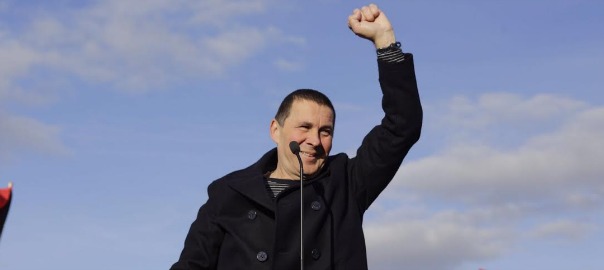06.11.2018 - 22:52
|
Actualització: 06.11.2018 - 23:52
The European Court of Human Rights, in Strasbourg, has ruled that Spain’s National Court violated Basque pro-independence leader Arnaldo Otegi’s right to a fair trial. Otegi was sentenced to 10 years in prison –later lowered to six and a half by the Supreme Court– and was barred from public office for 10 years for allegedly being part of the ETA separatist organization and following its orders to rebuild the left-wing Basque pro-independence political movement. After serving the full sentence, Otegi is now free but is still unable to stand in elections.
After exhausting all appeals in Spanish courts and getting a final rejection by the Spanish Constitutional Court in 2014, Otegi took his case to Strasbourg, where the European court ruled on Tuesday that article 6.1 of the European Convention on Human Rights on the “right to a fair trial” had been violated.
No compensation
Yet Strasbourg gives no compensation to the Basque politician, as it claims that “the finding of a violation alone was sufficient just satisfaction.”
What’s more, the ECHR claims that Spain has “a domestic procedure that could lead to judgments being reviewed and revised where the Court had found a violation of the Convention”.
“Where such remedies existed they were the most appropriate form of redress” adds the court.
Prejudices
The case involving the current leader of the EH Bildu leftist pro-independence Basque coalition and four more individuals, known as ‘Bateragune case,’ had been tainted with suspicions of partiality.
In a trial at the Spanish National Court for a prior case, judge Ángela Murillo asked Otegi whether he condemned terrorism. He did not answer, something that prompted her to say: “I knew you would not answer to this question.”
Her comments led to accusations of ‘prejudice’ and the Supreme Court annulling the trial -in a later procedure, he was in the end absolved.
Then, in the ‘Bateragune case’ Otegi asked unsuccessfully to not being tried by a court including Murillo. Spain’s National Court went on to find him guilty of following orders of ETA, with Murillo involved in the ruling.
“The presiding judge’s [Murillo] remarks in the trial against Mr Otegi Mondragón could therefore have raised legitimate doubts in the minds of all the applicants in the second case about her being prejudiced” reads the verdict.


